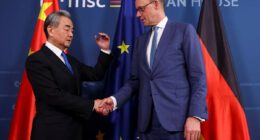Share this @internewscast.com
In the wake of the global bow waves created by President Trump’s quixotic approach to trade and tariffs, investors have been scurrying toward so-called safe-haven assets.
Gold has soared to record levels as individuals, banks, investment funds, and even governments seek a hedge against what increasingly resembles an all-out confrontation between the US and China.
At home, comfort is being sought in traditional ‘defensives’. Grocers such as Tesco and Sainsbury (and even the tobacco sector) are seeing renewed interest. The common theme is reliable earnings and dividends in times of stress.
Beyond the FTSE giants, analysts are screening for the same qualities in the small and mid-cap sector. Deutsche Bank this week highlighted its top 10, a predictable list of homegrown names, largely insulated from tariffs and the now-looming threat of global recession.
But what the likes of Deutsche and its peers have been slower to spot, principally because their algorithms don’t allow for it, are value stocks below the £500million threshold.
And here, in the market’s overlooked undergrowth, sit a handful of businesses that are cash-generative, growing, stable and largely unbothered by the storm of bad news emanating from Washington.

New rules: Optima Health provides outsourced occupational health services
One such company, though by no means the only example, is Optima Health. With a market capitalisation of £160million, it doesn’t make it onto most institutional screens but probably should.
Optima’s model is simple, but well executed. Its buy-and-build strategy has been stress-tested enough to suggest the business can continue to make earnings-accretive acquisitions that underpin growth.
Led by chief executive Jonathan Thomas, the company provides outsourced occupational health services.
Specifically, this includes risk management, health surveillance, fitness assessments, workplace health advice and adaptations, employee wellbeing support, and ‘evidence-based clinical interventions to support employees to be healthy at work’.
The aim is to maximise attendance and performance while safeguarding employee health and ensuring their roles remain suitable.
At its core is a digitally enabled, flexible operating model that allows the business to scale rapidly as contracts and acquisitions are added.
Optima supports over five million employees across the UK and directly employs over 800 multidisciplinary occupational health clinicians and around 1,500 total staff.
Its infrastructure includes over 50 occupational health clinics, more than 1,700 counselling providers, and upwards of 900 physiotherapists, all supported by 38 mobile screening units.
Optima’s revenues are long-term, contracted and recurring, drawn from both the public and private sectors.
‘This makes us pretty resilient to economic shocks and disruption,’ says Thomas. Occupational health, he points out, is a regulatory must-have, not a discretionary extra to be dropped in lean times.
It’s this defensive profile that makes Optima stand out. The UK occupational health market is worth £1.2billion and is forecast to grow at 4 per cent a year through 2028.
Despite this, 80 per cent of UK employers still don’t offer any occupational health provision, even as ill-health and presenteeism cost the economy an estimated £150billion annually.
Optima is targeting a 25 per cent share of the market through a mix of organic growth, expansion and acquisitions.
The group is focusing on bolt-on deals, complementary services and entry into new sectors, supported by a scalable platform and a tested integration model.
Its latest deal, Cognate Health, for up to €9million, will be earnings-accretive from day one. Just as important, it gives Optima its first foothold in the Republic of Ireland.
Crucially, Optima’s buy-and-build strategy is more than a simple arbitrage on private versus public company valuations. It is underpinned by synergies. Plugging new operations into Optima’s digital backbone delivers immediate cost benefits.
Thomas and his team are also looking at ways to cross-sell new products into their existing client base.
And by winning work from major clients across both public and private sectors, including multinationals, large blue light emergency services, and national infrastructure organisations, the group has shown it can handle complex, large-scale public sector contracts.
The same credentials helped secure a high-profile win: a deal to deliver recruitment medicals for the UK armed forces in partnership with Serco.
‘It looks like a new market,’ says Thomas, ‘but actually it’s very similar to what we already deliver at scale for existing clients. We’ll look at more opportunities like that just outside the core occupational health space.’
Though it was only listed on AIM in September, Optima has a long track record of growth. Previously part of the stock market quoted group Marlowe, and before that under private equity ownership, it now leads what remains a highly fragmented market.
Revenues are expected to reach £115million this year. The company has access to a £20million revolving credit facility, half drawn, and Thomas suggests there’s scope for further debt funding if a larger opportunity arises. Strong cash generation will also help fund the next leg of growth.
RBC, in a recent note, praised Optima’s defensive qualities. It highlighted regulatory support and loyal customers, and noted that the company is growing faster than the market, a useful shield against wider economic gloom.
Following the Cognate acquisition, RBC raised its price target to 220p, up from 215p. That’s based on a valuation of 10.8 times forecast 2025 earnings (EV/EBITDA).
Currently trading at around 8 times, RBC expects the multiple to rise toward levels seen across the insurance and healthcare sectors, typically 9.3 to 12.8 times.
Panmure Liberum was also positive, raising its target to 212p from 208p. Its valuation uses a blend of peer comparisons and discounted cash flow. Optima’s shares are currently trading at 177p.
Even so, Optima isn’t bulletproof. One curveball came in the form of a surprise hike in employers’ National Insurance contributions, announced by Chancellor Rachel Reeves in her Spring Statement. It will add to costs, which Optima will need to mitigate through growth and technology enhancements.
But as these things go, Optima looks as solid as a company can be in this environment. It may not have excited investors during the AI and tech frenzy, but it looks much more compelling amid tariffs and macro uncertainty.
It’s definitely one for the watch list.
For all the breaking news on mid- and small-cap companies go to www.proactiveinvestors.co.uk
DIY INVESTING PLATFORMS
AJ Bell

AJ Bell
Easy investing and ready-made portfolios
Hargreaves Lansdown

Hargreaves Lansdown
Free fund dealing and investment ideas
interactive investor

interactive investor
Flat-fee investing from £4.99 per month
InvestEngine

InvestEngine
Account and trading fee-free ETF investing
Trading 212
Trading 212
Free share dealing and no account fee
Affiliate links: If you take out a product This is Money may earn a commission. These deals are chosen by our editorial team, as we think they are worth highlighting. This does not affect our editorial independence.
Compare the best investing account for you








